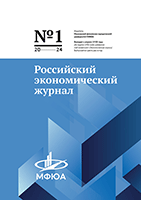Архив
Российский экономический журнал 1 / 2019
Германия в поисках ответов на миграционные вызовы
Зарицкий Б.Е.
Зарицкий Б.Е., доктор исторических наук, профессор кафедры мировой экономики МГИМО МИД России
Аннотация. В статье анализируется влияние притока мигрантов на демографическую ситуацию и рынок труда в Германии. Несмотря на растущее неприятие населением миграционной политики, проводившейся правительством А. Меркель в течение последних лет, среди части немецких экспертов распространено мнение, согласно которому экономика Германии требует постоянного притока мигрантов, без которых невозможно компенсировать сокращение трудовых ресурсов в связи с неблагоприятной динамикой демографической ситуации. Автор считает, что обострившаяся в последние годы в Германии проблема дефицита рабочей силы имеет структурный характер и не в последнюю очередь связана с недостаточно эффективным использованием собственного трудового потенциала страны, изъянами в системе регулирования рынка труда. Фактически уже сегодня резервная армия труда в Германии значительно больше, чем об этом можно судить по численности официально зарегистрированных безработных. Однако если распиаренная стратегия «Индустрия 4.0» действительно обеспечит декларируемые результаты, не исключено, что в недалеком будущем обсуждать придется проблему не дефицита, а избыточности трудовых ресурсов.
По мнению автора, результаты его анализа могут представить интерес для российской системы властно-управленческих институтов, которая на всех своих уровнях постоянно сталкивается с серьезными миграционными вызовами.
Ключевые слова: Германия (ФРГ), миграция, мигранты, миграционные потоки, миграционная политика, миграционные вызовы, демографическая ситуация, рождаемость, возрастная структура населения, рынок труда, нехватка рабочей силы, безработица, занятость, квалифицированные специалисты, «утечка мозгов», переобучение, германская стратегия «Индустрия 4.0».
Germany in search of answers to migration challenges
Zaritskiy B.E., Dr.of Sc. (History), Professor of the Department of World Economy, Moscow State Institute of International Relations (University)
Abstract. The article represents the analysis of the impact of migrant’s afflux on the demographic situation and labor market in Germany. In spite of increasing rejection by the population of the migration policy implemented during last years by Ms A. Merkel’s government, some German experts in this matters continue to reserve an opinion that Germany needs such migration since allegedly there is no other way to compensate the decrease in labor forces due to the negative demographic trends. The author express his opinion that the deficit of labour forces which became more acute in Germany during last years has a structural origin, and one of its reasons is based on insufficiency in effective management of existing labour forces of the country and defects in the system of labour market’s regulations. Actually the labor potentially available up-to-date on the German market is much broader than one could imagine on the basis of the number of registered unemployed persons. In case if largely promoted strategy “Industry 4.0” will definitively give its results, one could not exclude that in the near future one should be obliged to discuss the issue of an excess of labour forces instead of its deficit.
Keywords: Germany (FRG), migration, migrants, migration flows, migration policy, migration challenges, demographic situation, birth- rate, age-pyramid of population, migration flows, labor market, deficit in labor, unemployment, employment, qualified specialists, brain-drain, re-education, the German strategy of «Industry 4.0».
Библиографический список
1. Arbeitsagentur-Chef fordert Einwanderungsgesetz. — URL:https://www.faz.net/aktuell/wirtschaft/arbeitsagentur-chef-scheele-fordert-einwanderungsgesetz-gegen... (дата обращения –16.11.2018).
2. Auswirkungen der Migration auf den deutschen Arbeitsmarkt. — URL: https://statistik.arbeitsagentur.de/Statischer-Content/Statistische-Analysen/Statistische- Sonderberichte/Generische-Publikationen/Auswirkungen-der-Migration-auf-den-Arbeitsmarkt.pdf (дата обращения — 16.11.2018).
3. Bevoelkerung Deutschlands bis 2050. 11. Koordinierte Bevoelkerungsvorausberechnung. –URL:https://www.destatis.de/DE/Publikationen/Thematisch/Bevoelkerung/VorausberechnungBevoelkerung/BevoelkerungDeutschland2050Presse5124204069004.pdf;jsessionid=11F2F83272E59109F4E9EA3C3797E939.
InternetLive2?__blob=publicationFile (дата обращения — 16.11.2018).
4. Blaue Karte EU. — URL: www.bamf.de/SharedDoes/Pressemitteilungen/DE/2018/20180731-007-pm-blaue-karte-en.html (дата обращения — 16.11.2018).
5. Bonin H. Der Beitrag von Auslaendern und kuenftiger Zuwanderung zum Staatshaushalt. — URl: https://www.bertelsmann-stiftung.de/fileadmin/files/BSt/Publikationen/GrauePublikationen/Studie_IB_D... Beitrag_von_Auslaendern_und_kuenftiger_Zuwanderung_zum_deutschen_Staatshaushalt_2014.pdf (дата обращения — 16.11.2018).
6. Deschermeier Ph. Bevoelkerungsentwicklung in den deutschen Bundelaendern bis 2035. — URL: https://www.researchgate.net/publication/281834473_Die_Bedeutung_des_zukunftigen_Kohorteneffekts_auf_den_Wohnflachenkonsum.pdf (дата обращения — 16.11.2018).
7. Deutsche Bundesbank. Monatsbericht. April 2017. — URL: https://www.bundesbank.de/DE/publikationen/berichte/monatsberichte/monatsbericht-april2017 (дата обращения — 16.11.2018).
8. Eckert D. Deutschland wird zum Taktgeber fuer die globale Voelkerwanderung. — URL: https://www.welt.de/wirtschaft/article177870870/Migration-Mehr-Zuwanderer-als-Deutschland-nehmen-nur-noch-die-USA-auf.html (дата обращения — 16.11.2018).
9. Hartmann M. Auswirkungen der Migration auf den deutschen Arbeitsmarkt. — URL: https://www.statistik.bayern.de/medien/statistik/BIZ/auswirkungen_der_migration_auf_den_deutschen_arbeitsmarkt__gastbeitrag_.pdf (дата обращения — 12.11.2018).
10. In Deutschland leben so viele Auslaender wie noch nie. Wo kommen sie her? — URL: https://orange.handelsblatt.com/ artikel/20581.pdf (дата обращения — 16.11.2018).
11. Interview mit Dr. Volker Meyer-Guckel. — URL: https://www.ghst.de/interview-volkermeyer-guckel-integration/ (дата обращения — 16.11.2018).
12. Jahresbericht 2017 des Forschungszentrums. — URL: https: //www.bamf.de/SharedDoes/Anlagen/DE/publikationen/Broschueren/jahresbericht-forschungszentrum-2017.pdf... (дата обращения — 16.11.2018).
13. Kern S. Deutschlands demografische Zukunft ist muslimisch. — URL: https://de.gatestoneinstitute.org/9936/deutschlands-demografische-zukunft-ist- muslimisch.pdf (дата обращения — 12.11.2018).
14. Statistisches Jahrbuch 2017. — URL: https://www.destatis.de/DE/Statistisches Jahrbuch/Bevoelkerung. pdf?_blob=publicationFile (дата обращения — 16.11.2018).

